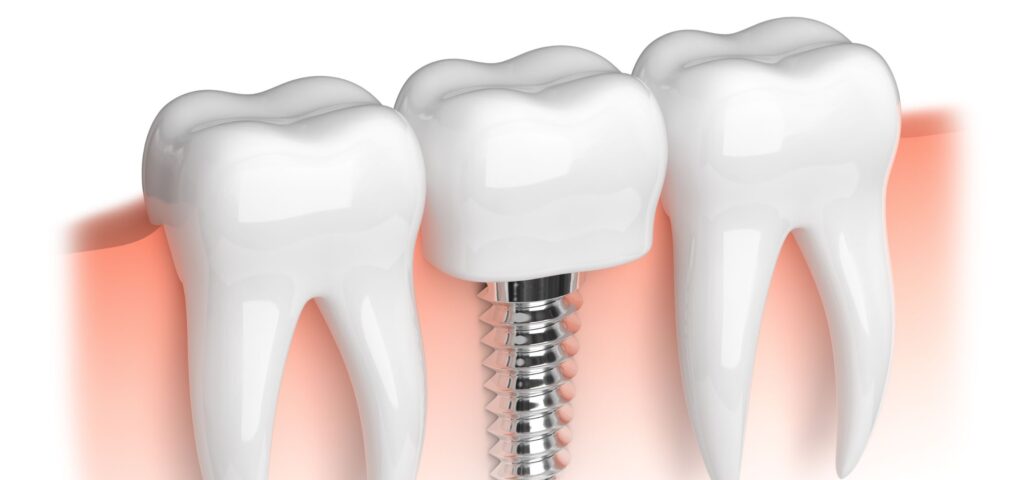In areas where the bone loss is extensive, a separate bone grafting or bone implant procedure may be necessary to regain the bone foundation. We provide a large range of bone grafting services restoring single tooth sites to the entire mouth.
Often, patients have been told by others that there is nothing that can be done for them. If you are wondering if you are a candidate, please contact us for an evaluation.

Bone implants or bone grafting consist of a host of procedures that allow us to rebuild the bony defects and regain a solid foundation to support the new tooth implant. When a tooth is removed, the extraction socket may benefit from bone grafting regardless of whether a tooth implant is to be placed or not. It is, however, more important for the bone graft to be placed when a replacement tooth implant is inserted at the time of the tooth extraction. For areas where the tooth has been lost for some time, the site may have already have experienced bone loss. In these cases, a different type of bone graft will be required to rebuild the lost tissue volume.

Bone graft material is considered a type of bone implant. They vary in size and shape. The bone graft material may come from human tissue, animal tissue as well as synthetic sources. Regardless of the types of bone grafts, it should be appreciated that the bone-implant material that we use is strictly regulated. They have been highly sterilized and processed to be safe for human use according to safety guidelines prescribed by Health Canada. It is possible to regain enough bone and transform from a severely atrophic or broken down mouth to one that can support multiple tooth implants and fixed crowns and bridges.
Dr. Liang has a specific interest in the most challenging cases of bone grafting and restorative reconstruction.

Bone graft material is considered a type of bone implant. They vary in size and shape. The bone graft material may come from human tissue, animal tissue as well as synthetic sources. Regardless of the types of bone grafts, it should be appreciated that the bone-implant material that we use is strictly regulated. They have been highly sterilized and processed to be safe for human use according to safety guidelines prescribed by Health Canada. It is possible to regain enough bone and transform from a severely atrophic or broken down mouth to one that can support multiple tooth implants and fixed crowns and bridges.
Dr. Liang has a specific interest in the most challenging cases of bone grafting and restorative reconstruction.
A bone implant is a surgical procedure to replace missing teeth with a titanium implant that is anchored in the jawbone.
The length of the bone implant procedure varies depending on the individual case, but it usually takes several months from start to finish.
Discomfort is usually not a problem during the bone implant procedure. You will be given appropriate medications during and after the procedure to manage any pain.
You may be without your teeth for several days after the bone implant procedure. However, we will make sure that in the interim period, you look and feel very natural.
Yes, bone implants are a safe and effective solution for missing teeth, with a high success rate and long-lasting results.
The cost of bone implants varies depending on the individual case, including the number of implants needed and the type of restoration required.
Like any surgical procedure, there is a risk of infection or complications with bone implants. However, with proper care and maintenance, the risk is minimal.
With proper care and maintenance, bone implants can last a lifetime. However, they may need to be replaced or repaired if they become damaged or infected.
There is no minimum age for bone implants, but the jawbone must be fully developed before the procedure can be performed. This typically occurs in the late teens or early twenties.
The extent of insurance coverage for bone implants varies depending on the individual policy. It is important to check with your insurance provider to determine what is covered.
Dr. Liang enlists the assistance of a cohesive group of professional dentists, specifically trained to handle advanced implant dentistry needs as well as provide the most comfortable visit for our patients. Based on our vision of continued quality improvement, we are proud of the restorative and maintenance results that we can achieve for our patients. Although we continue to grow, the personal touches that make us successful have not changed.


Dr. Liang, Diplomate, American Board of Oral Implantology, attended the University of British Columbia and received his Bachelor's degree in Microbiology in 1981 and his Doctor of Dental Medicine degree in 1983. At graduation, he was awarded the Canadian Oral and Maxillo-Facial Prize for highest standing in the area of Oral Surgery.


Dr. Tsang attended UBC where he studied mathematics before heading to Philadelphia to study at Temple University School of Dentistry. Dr. Tsang currently practices general dentistry in Abbotsford. He joins Dr. Liang and his team as an associate and implant dentist. As a life-long learner, he participates in hundreds of hours of continuing education each year.


Eric is a general dentist and White Rock local. After living and studying dentistry in Australia, he is proudly serving the community alongside his father. He is a member of the Fraser Valley R.V. Tucker Cast Gold study club, as well as periodontal and implant study clubs.










We thoroughly examine your oral cavity, including teeth, gums, and surrounding tissues, to identify any issues or abnormalities.




Choose our South Surrey dentists for exceptional care and expertise. With our skilled team, advanced technology, and commitment to your family’s oral health, we provide top-quality dental services in a comfortable and welcoming environment.

With years of practice, our dentists have honed their skills and gained a wealth of knowledge in various dental procedures.

Our dentists are not only skilled practitioners but also mentors in prestigious dental training programs.

From routine check-ups and cleanings to advanced procedures like dental implants, our clinic is the solution for all your dental concerns.

Our dentists prioritize your comfort, aesthetics, and long-term oral health by tailoring treatment plans based on your unique needs and goals.

We prioritize easing any dental visit concerns by creating a warm, "feel like home" environment with friendly staff and caring dentists.

We provide you with the highest standard of care using advanced tools and techniques to ensure accurate diagnoses and effective treatments.

Our dental clinic prioritizes patient education, empowering them to make informed decisions about their oral health.

Our patients' testimonials for our White Rock dental office speak volumes about the quality of care and service we provide for them and their family.






Let the experiences of others guide you. Read on to find out why so many people have chosen us as their family dentist, and how we’ve managed to surpass their expectations time and time again.
Dr. Liang and his team did an amazing job removing my impacted wisdom teeth. The process was painless, and they made me feel very relaxed and comfortable. This was definitely the best dental care experience I’ve ever had, thank you!
Great friendly staff. Very helpful, informative and accommodating. Easy to find with good parking. Dental work was done without issue and good follow up. All options were discussed. Full recovery faster than I expected. Wouldn’t go anywhere else.
My wife has relied on Dr. Liang for approximately 25 years. She has had several crowns and an implant plus regular cleaning. Most recently, she had gum repair surgery. Dr. Liang is very skilled, and his staff are friendly and professional. His office uses the latest techniques and equipment. Very highly recommended.
I had my severely impacted wisdom teeth removed by Dr. Liang and the team and they did an amazing job. I healed very quickly and pain free. I cannot recommend them more.
When I stepped into the clinic, I was welcomed by a friendly staff who gave me detailed information about my appointment. People feel more at ease in the office since it is so well-kept and clean. They also have the best White Rock dentists, Dr. Liang is highly knowledgeable, incredibly friendly, and professional. He was really nice while being thorough. Definitely recommend!
Dr. Liang is a highly skilled and very kind dentist. His assistants are all professional and friendly. The whole treatment process is well organized and smoothly. My implants are very successful.
My dental implants experience with Dr. William Liang was superb! The feeling of self-worth that was given to me is priceless. The staff was amazing and very kind in helping me with my teeth implants needs. My teeth now look so natural and I can't begin to imagine that was ever possible. I can not thank Dr. William Liang enough for his professionalism. I will surely refer Smile Dental Implant Center to anyone in need of teeth implants. I will definitely return for my future dental implants soon!
Wonderful dental team. Passionate about their work. They went above and beyond to make the dental implants or teeth implants possible for me. Dr. William Liang is excellent! The assistant was so patient and compassionate too and they work so well together. We have been bragging so much about how awesome our experience was that my other 2 daughters and my sisters are coming with me to Surrey for my follow-up so they can meet everyone! I’m very very grateful and without a doubt made the right choice to have my dental implants or teeth implants done here. You will never know how much this has meant to me!!! Thank you from the bottom of my heart.
Welcome to our collection of the most recent dental care articles, curated to keep you informed and educated on the latest trends, breakthroughs, and best practices in oral health.
The journey of choosing between dentures and dental implants can be complex. Both options have their pros and cons, and deciding on which one suits
In the realm of modern dentistry, dental implants have emerged as a prominent solution for replacing missing or damaged teeth, offering an alternative to traditional
Contact Email Address:
info@implant.ca
Clinic Number
+1 (604) 330-8626
Clinic Address
1959 152 St,
Surrey, British Columbia (BC),
V4A 9E3
Clinic Hours
Mon: 8 am to 5 pm
Tue: 8 am to 5 pm
Wed: 8 am to 7 pm
Thu: 8 am to 5 pm
Fri: 8 am to 5 pm
Sat: Closed
Sun: Closed